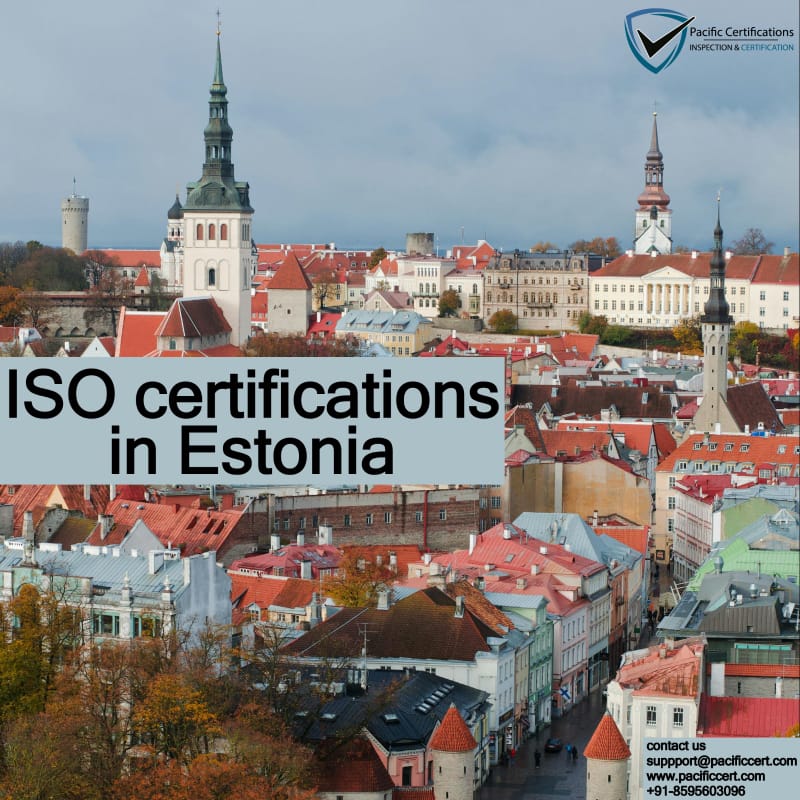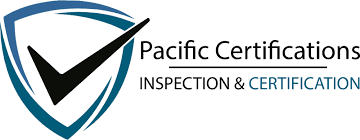ISO Certifications in Estonia, Popular Standards, Requirements and Benefits

Introduction
ISO certifications play a crucial role in enhancing the quality, safety, and efficiency of products and services across various industries worldwide. In Estonia, as in other countries, obtaining an ISO certification can significantly improve a company's marketability, compliance with legal requirements, and overall performance. At Pacific Certifications, with our expertise and accreditation, we are well-positioned to assist organizations in Estonia through the process of audit and certification for various ISO standards.
ISO Certifications in Estonia
In Estonia, businesses and organizations often pursue ISO certifications to meet regulatory requirements, enter new markets, or improve internal processes and product quality. The most commonly sought-after ISO certifications include:
ISO 9001
This is the international standard for quality management systems (QMS). It helps organizations ensure they meet customer and other stakeholder needs within statutory and regulatory requirements related to a product or service.
ISO 14001
This standard focuses on effective environmental management systems (EMS), helping organizations improve their environmental performance through more efficient use of resources and reduction of waste.
ISO 45001
This is the standard for occupational health and safety management systems. It provides a framework to increase safety, reduce workplace risks, and enhance health and well-being at work.
ISO 27001
This standard is designed for information security management systems (ISMS). It helps organizations secure their information assets such as employee details, financial information, or intellectual property.
Click here to find out more applicable standards to your industry
How Pacific Certifications Can Help?
Audit & Certification Process:
Documentation Review: A thorough review of your organization's documentation will be performed to ensure that the documented processes meet the requirements of the standard.
Certification Audit: The certification audit is conducted in two stages. Stage 1 is a preliminary review to check if your organization is ready for full evaluation. Stage 2 is a more detailed examination of your organization's implementation of the ISO standard.
Issuance of Certification: Upon successful completion of the certification audit, We will issue the ISO certification, recognizing your organization’s adherence to the specific ISO standard.
Surveillance Audits: To maintain certification, periodic surveillance audits are conducted to ensure ongoing compliance with the standard.
Requirements of ISO Certifications in Estonia
The requirements for obtaining ISO certifications in Estonia, while aligned with the global ISO standards, also take into account any local regulations and business practices. The International Organization for Standardization (ISO) develops these standards to ensure quality, safety, efficiency, and trust. The process of obtaining an ISO certification generally involves demonstrating compliance with the specific standards and passing an audit conducted by an accredited certification body, such as Pacific Certifications. Here's a detailed look at the requirements for some of the key ISO certifications:
ISO 9001: Quality Management Systems (QMS) Requirements
- Leadership Commitment: Top management must demonstrate their commitment to the QMS by ensuring customer focus, establishing quality policies, and setting quality objectives.
- Customer Focus: Organizations must understand and meet customer and applicable statutory and regulatory requirements.
- Risk Management: Identifying and addressing risks and opportunities associated with organizational context and objectives.
- Process Approach: Managing activities as processes and understanding how they interact.
- Continuous Improvement: The organization must continually improve its processes and overall QMS.
ISO 14001: Environmental Management Systems (EMS) Requirements
- Environmental Policy: Developing an environmental policy that reflects the organization's commitments.
- Planning: Identifying environmental aspects, legal and other requirements, risks, and opportunities.
- Support and Operation: Ensuring availability of resources, roles, responsibilities, and authorities are assigned and communicated.
- Performance Evaluation: Monitoring, measurement, analysis, and evaluation of the EMS performance.
- Improvement: Addressing nonconformities and taking corrective actions for continual improvement.
ISO 45001: Occupational Health and Safety Management Systems Requirements
- Worker Participation: Requires the participation and consultation of workers in the development, planning, implementation, and performance evaluation of the health and safety management system.
- Hazard Identification and Risk Assessment: Identifying and assessing occupational health and safety risks and opportunities.
- Operational Controls: Implementing controls to manage risks, legal compliance, and other requirements.
- Performance Monitoring: Monitoring and measuring occupational health and safety performance against policies and objectives.
- Management Review and Continuous Improvement: Management must periodically review the system's performance and seek continual improvement.
ISO 27001: Information Security Management Systems (ISMS) Requirements
- Context of the Organization: Understanding the organizational context, including the needs and expectations of interested parties.
- Leadership: Establishing an information security policy and assigning roles and responsibilities.
- Risk Assessment: Conducting information security risk assessments and defining risk treatment plans.
- Security Controls: Implementing appropriate security controls to mitigate identified risks.
- Monitoring and Review: Monitoring, measurement, analysis, and evaluation of information security performance and effectiveness.
Benefits of ISO Certifications in Estonia
ISO certifications in Estonia offer a multitude of benefits to organizations across various industries. These certifications are not just badges of compliance but strategic tools that can help organizations improve their processes, products, and services. Pacific Certifications, with our comprehensive approach to audit and certification, enables businesses to unlock the full potential of these benefits, enhancing competitiveness and operational efficiency. Here are some key benefits of obtaining ISO certifications in Estonia:
Enhanced Quality and Efficiency
Process Improvement: ISO standards, such as ISO 9001, emphasize the importance of quality management systems and continuous improvement. Organizations can streamline their processes, reduce waste, and increase efficiency.
Consistent Quality: Following ISO standards helps ensure the consistency of products and services, leading to higher customer satisfaction and loyalty.
Marketability and Competitive Advantage
Global Recognition: ISO certifications are internationally recognized, making them a powerful marketing tool. They can enhance an organization's reputation and open up new markets, both domestically and internationally.
Competitive Edge: Certification can give businesses a competitive advantage by demonstrating their commitment to industry best practices and quality standards.
Compliance and Risk Management
Regulatory Compliance: Many ISO standards help organizations comply with legal and regulatory requirements. For example, ISO 14001 assists businesses in meeting environmental regulations.
Risk Management: Standards like ISO 27001 for information security and ISO 45001 for occupational health and safety emphasize the identification and management of risks, helping organizations mitigate potential issues before they arise.
Sustainability and Environmental Performance
Environmental Impact: ISO 14001 encourages organizations to consider their environmental impact and implement practices that reduce their footprint, such as waste management and energy efficiency measures.
Sustainability: By adopting environmentally friendly practices, organizations can contribute to sustainability goals, enhancing their corporate social responsibility (CSR) profile.
Customer Satisfaction and Trust
Meeting Customer Expectations: ISO certifications often require organizations to focus on customer needs and feedback, leading to improved product quality and customer service.
Building Trust: Certification demonstrates an organization's commitment to maintaining high standards, building trust among customers, stakeholders, and partners.
Employee Engagement and Safety
Workplace Safety: ISO 45001 focuses on creating safer working environments, reducing workplace accidents, and promoting employee well-being.
Employee Morale: Implementing ISO standards can lead to a more engaged and motivated workforce, as employees understand their roles in quality and safety processes better.
Which industries need ISO Certifications in Estonia?
ISO certifications are versatile and applicable across a wide range of industries in Estonia, reflecting their universal design to ensure quality, safety, environmental management, information security, and more. These certifications can help organizations comply with legal requirements, meet customer expectations, and compete more effectively in the global market. Here's an overview of industries that particularly benefit from ISO certifications in Estonia, and how we at, Pacific Certifications can assist them:
Manufacturing
- ISO 9001 (Quality Management): Ensures consistent product quality and reliability, which are crucial in manufacturing.
- ISO 14001 (Environmental Management): Helps manage environmental impacts and comply with regulations.
- ISO 45001 (Occupational Health and Safety): Important for ensuring a safe working environment in manufacturing facilities.
Information Technology (IT) and Telecommunications
- ISO/IEC 27001 (Information Security Management): Critical for protecting data and ensuring business continuity.
- ISO 20000 (Service Management): Ensures IT services are aligned with business needs and international best practices.
Construction and Real Estate
- ISO 9001: For quality management in construction projects, ensuring they meet customer and regulatory requirements.
- ISO 45001: To manage health and safety risks in construction sites.
Healthcare
- ISO 13485 (Medical Devices): Ensures the quality and safety of medical devices.
- ISO 9001: Can be applied to improve the quality management systems of healthcare providers.
Food Industry
- ISO 22000 (Food Safety Management): Helps organizations in the food chain to manage food safety hazards.
- ISO 9001: For quality management across food production, processing, and distribution.
Energy and Utilities
- ISO 50001 (Energy Management): Helps organizations in the energy sector improve their energy performance and efficiency.
- ISO 14001: Important for managing environmental impacts and sustainability in energy production and distribution.
Education and Training
- ISO 21001 (Educational Organizations Management Systems): Aids educational institutions in enhancing the satisfaction and learning experience of students.
- ISO 9001: For improving quality management systems in education and training services.
Financial Services
- ISO/IEC 27001: Particularly relevant for protecting financial data and ensuring the integrity of financial transactions.
Transportation and Logistics
- ISO 9001: For quality management in logistics and transportation services, ensuring efficiency and customer satisfaction.
- ISO 14001: Helps manage environmental impacts in transportation and logistics operations.
Contact Us
Pacific Certifications is accredited by ABIS, in case you need support with ISO certification for your business in Estonia, please contact us at [email protected] or +91-8595603096.
Ready to get ISO certified?
Contact Pacific Certifications to begin your certification journey today!
Suggested Certifications –
Read more: Pacific Blogs

